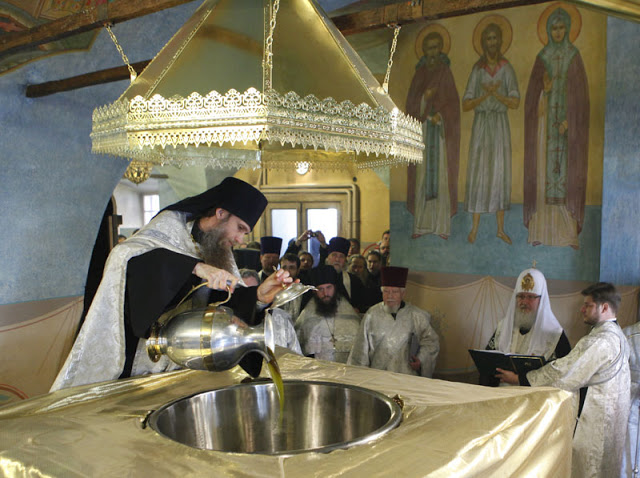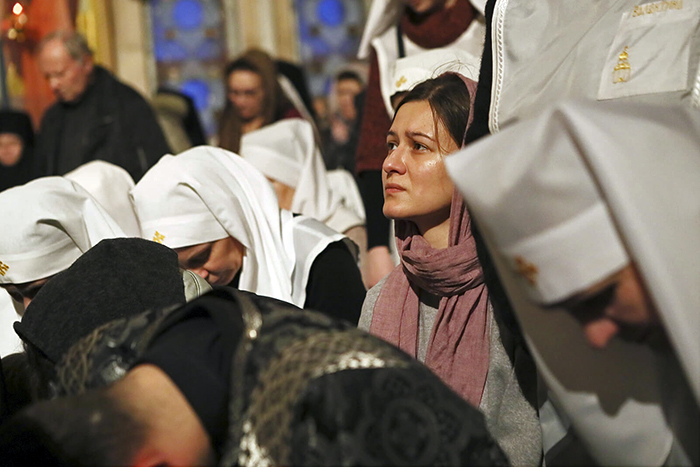
Sometimes people say, “I am just a reader,” as though this were a petty or insignificant ministry. However, when the reader (whether tonsured or not) begins chanting the selection from the Acts or the Epistles, he or she is performing an evangelical ministry that is absolutely essential to the celebration of the Divine Liturgy, and as such it demands the same care and preparation as any other liturgical ministry.
Orthodox Christian liturgy is an encounter with the incarnate Word of God, made possible through intelligible worship that touches us through every human sense: sight, smell, hearing, touch, and taste. Yet, when we consider all the elements that comprise Orthodox liturgy—including processions, icons, incensations, making the sign of the cross, prostrations—the balance of worship is conducted through language. It is through the God-given gift of human language that we hear the Good News, the Gospel of Jesus Christ; that we sing the liturgical texts, the psalms, the troparia, and the Creed; and that we pray and encounter Jesus Christ, the Incarnate Word of God.
At the epiclesis (the calling down of the Holy Spirit upon God’s people and the gifts of bread and wine) in the anaphora of the Divine Liturgy, we pray along with the priest, “Again we offer unto Thee this reasonable and bloodless worship.” The Greek word here translated as “reasonable” or “rational” is logikein, which comes from the root logos, the same word used by the evangelist in referring to Jesus Christ as the Word of God (John 1:10). Logikein refers to the human ability to think, know, and understand—the rational ability that sets human beings, made in God’s image and likeness, apart from irrational creatures. In short, one of the most characteristic facets of humanity is our ability to think, understand, and communicate through language. Thus, the Liturgy is not magic; when we gather for worship, we are not casting a spell. Rather we offer our thanksgiving, our eucharistia, to God through intelligible words. The primary task of the church reader is to proclaim the Word of God, and thus help facilitate the celebration of the Good News of Jesus Christ.
Of course, in the Divine Liturgy, it is the priest or deacon who reads from the actual writings we call “the Gospels.” However, not only do the Epistles of St. Paul predate the writings of the evangelists, but St. Paul himself reminds us that through his writings he is preaching the Gospel of Jesus Christ (a point St. Paul makes most forcefully in Galatians 1). Thus, when a reader reads the epistle at the Divine Liturgy, he or she is reading the Gospel; he or she is proclaiming the Good News of Jesus Christ. Sometimes people say, “I am just a reader,” as though this were a petty or insignificant ministry. However, when the reader (whether tonsured or not) begins chanting the selection from the Acts or the Epistles, he or she is performing an evangelical ministry that is absolutely essential to the celebration of the Divine Liturgy, and as such it demands the same care and preparation as any other liturgical ministry.
What Does a Church Reader Do?
The task of the church reader is to chant scriptural texts: the Acts of the Apostles or the Epistles in the Divine Liturgy; Old Testament readings at Vespers for certain feasts; sometimes the Canticle of St. Simeon (Luke 2:29–32) and the Lord’s Prayer (Matt. 6:9–13); and at all of the daily offices, excerpts from the Psalms. In fact, aside from short texts like the Trisagion prayer or the “Glory . . . Now and ever . . .” that concludes readings from the Psalter, the church reader is fundamentally a reader of Scripture.
This should not be surprising, since Orthodox liturgical worship is scriptural, first and foremost. Not only are the services themselves composed largely of texts taken directly from the Bible, but the church year is based on Scripture. The content of most of the church feasts is taken directly from the New Testament. It is only through the evangelist’s account of such events as the Nativity or the Transfiguration that we celebrate these feasts of our Lord and Savior. Could we imagine celebrating the Feast of the Nativity without hearing St. Matthew’s account of our Lord and Savior’s birth (Matt. 2:1–12), or the Feast of the Transfiguration without hearing the evangelist’s account of that stunning revelation on Mount Tabor (Matt. 17:1–9)? Consider as well the Vesperal Liturgy of St. Basil on Holy Saturday with its fifteen Old Testament readings.
In all of these instances, it is our encounter with Scripture that forms and defines our encounter with God—Father, Son, and Holy Spirit. We could say that our liturgy is an entrance into a scriptural reality, or an opportunity for us to attain the mind of Scripture. And who is it (unless there is more than one deacon serving at the Liturgy) that proclaims the scriptural texts that define the Feasts of Ascension (Acts 1:1–12), Pentecost (Acts 2:1–11), and St. Stephen the Protomartyr (Acts 6:9—7:59)? It is the reader.
Before the reader begins chanting a scriptural text, its words are merely ink on paper, marks that do nothing by themselves. These graphic markings, however, become the life-giving words of Holy Scripture when they are given utterance by the reader. This is the fundamental task of the church reader: to give life to the Word of God contained in Holy Scripture. Through the voice of the reader chanting the scriptural text, we have the opportunity to encounter the Word of God—the Gospel of Jesus Christ.

The Principles of Church Reading
Two fundamental principles governing Orthodox worship are beauty and intelligibility. As we said earlier, the word must be intelligible to be a word, and nowhere in the Liturgy is this more acutely relevant than during the reading of Scripture. If a word is mumbled, mispronounced, or inaudible, it is not a word for the hearer; it is just a sound. Here we should note that, as a rule, music in the Orthodox Church is always a musical word. We do not have organ preludes or orchestral performances in the Liturgy primarily because these musical forms, as beautiful as they might be, are wordless. Thus, for church reading to be effective, it must be intelligible. Yet we cannot make intelligibility the sole criterion for church reading, because authentic Christian worship also requires beauty.
Acknowledging that the study of beauty has taken up thousands of volumes, we can simply say that the effort to make liturgical worship as beautiful as possible derives from love: God’s love for us and our love for God. When a family invites someone to their house for dinner, they generally make every effort possible to clean the house, fix a delicious meal, and provide a beautiful dining experience for their guest. Even if they lack a grand mansion, fine china, and gourmet ingredients, they still endeavor to do the best they can with what they have. They know that the entire meal—the food, its presentation, the setting of the table, the appearance of the house—is an expression of love for the guest.
This expression of love through beauty is also evident in our church buildings. Whether it be the great Hagia Sophia, a hand-carved Russian village church, or a small storefront mission in the United States, an Orthodox church building is always built and adorned as beautifully as possible. The beauty one beholds in the church building is a witness to the love for Jesus Christ concretely manifested in His faithful people. Likewise, the church reader is called to proclaim the Word of God intelligibly and beautifully as a concrete witness to the ultimate expression of God’s love, the Gospel of Jesus Christ…
Read full here: https://www.pravmir.com/church-reading-a-vital-ministry/



